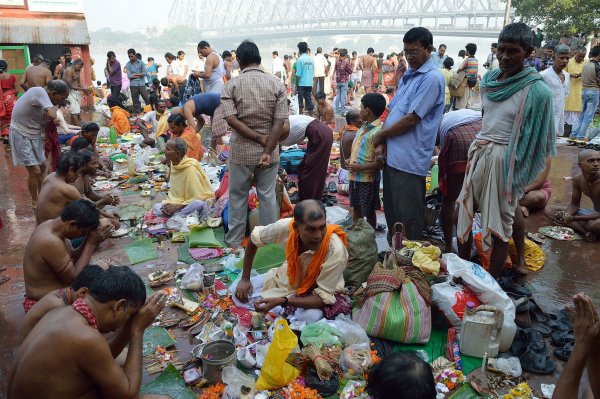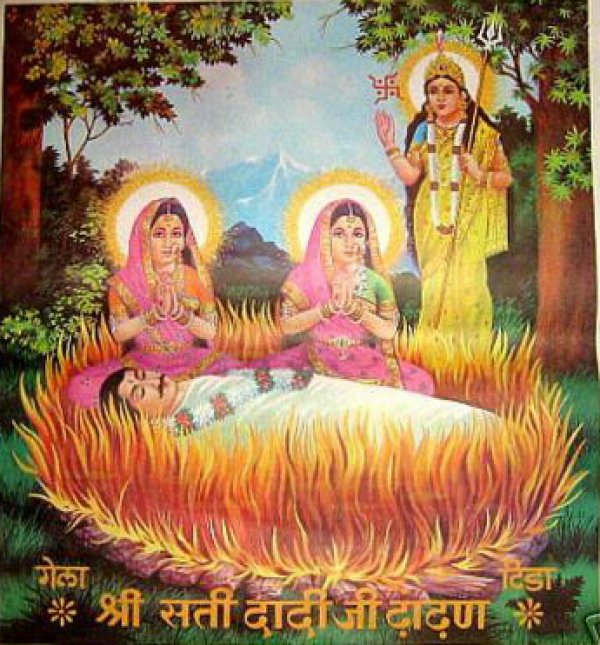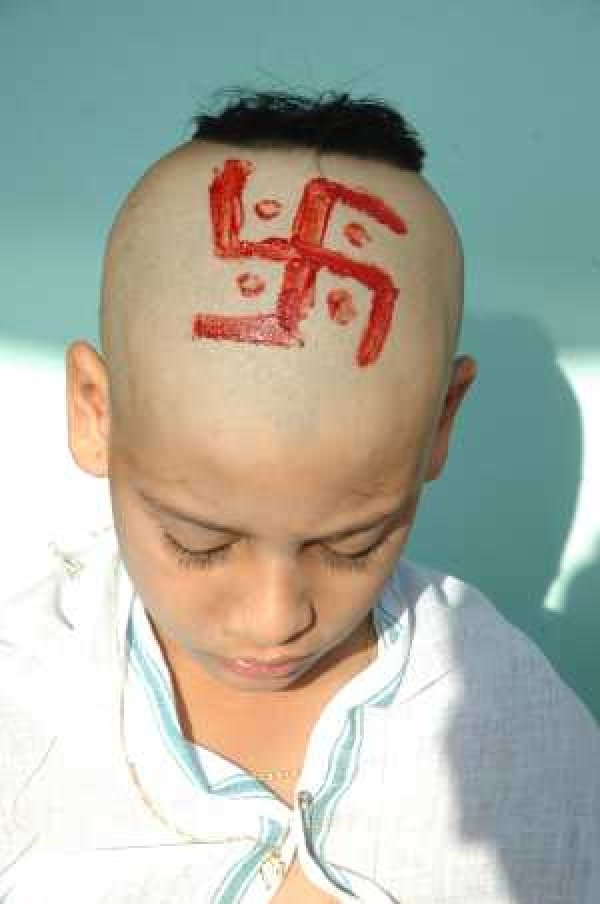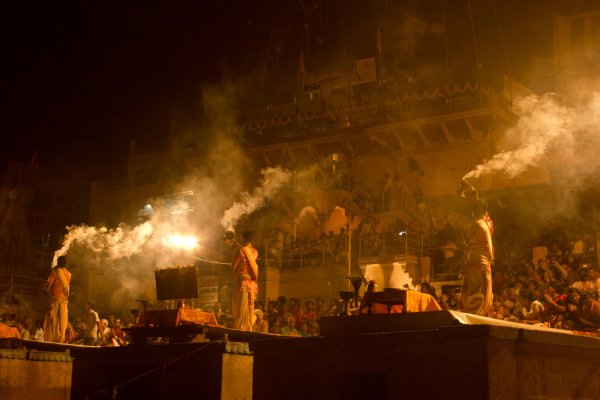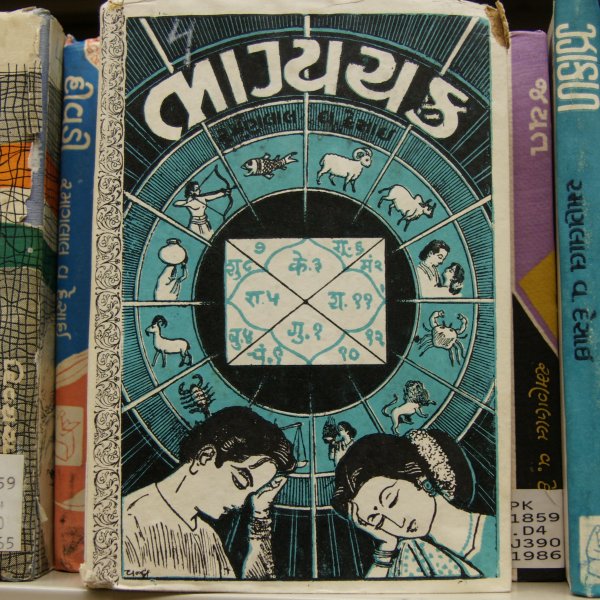Culture and Society: Superstitions and Folklore
General
Like most ancient civilizations, India has its share of superstitions that have survived and evolved over the years. With a nearly endless list of folk beliefs and superstitions, many of these beliefs and customs are based on religious texts and have become a way of life. Other superstitions are related to foretelling the future, reincarnation, and to animal and nature worship.
Specific Superstitions
Reincarnation
Reincarnation or "to be made flesh again" is a popular belief among the majority of Indian religions, including Hinduism, Buddhism, Jainism, and Sikhism. It holds the notion that the soul of all living beings survives death and is reborn to a new body in the physical world. As the soul passes through each of its lives in the physical world, it evolves based on its past experiences as well as the newly acquired experiences.
The Indian concept of reincarnation was first recorded in the Upanishads (part of the main scriptural text of Hinduism) around 800 B.C. In the Bhagavad Gita, which many consider as the most important epic of Hinduism, the soul has been described as immortal, while the physical form or body is subject to birth and death. Ancient Hindu scriptures intricately link reincarnation and karma (the factor determining one’s next reincarnation). As the soul passes through this journey of life and death, it eventually becomes dissatisfied with the superficial and limited happiness provided through worldly pleasures and starts to seek higher forms of happiness through spirituality. Once enlightened and free of worldly desires, the soul achieves moksha (liberation from the cycle of death and rebirth) and is not reborn again.
All Hindu households in India observe the Shraddha ritual in remembrance of their deceased ancestors. The ritual is observed either on the death anniversary of the deceased or during Pitri Paksha- the Fortnight of the Ancestors (between September 29 - October 13). During this period, people refrain from making purchases, accepting new jobs, starting a new business, or building a new house.
On the positive side, the principles of reincarnation provide a constructive perspective to questions such as: Why are people created unequally? Why do bad things happen to innocent people? Reincarnation, with its ties to karma, takes the blame away from a supreme being and puts it firmly in human hands. It propagates the notion of cause and effect- good actions and thoughts create good effects; bad actions create bad effects. What becomes of a person in this life or the next life will depend on his or her karma, which is what will be carried into subsequent lifetimes.
In India, most people following Hinduism, Buddhism, Jainism, and Sikhism believe in reincarnation. It is a part of everyday life and forms the basis of daily actions and routines. Reincarnation as a concept is fast gaining acceptance even in the west where some smaller, liberal branches of the Christian community include the concept. While Muslims around the world reject the notion of reincarnation, it plays an intrinsic part of the Native American beliefs. Reincarnation is also accepted by several contemporary movements such as Spiritism, Scientology, and Anthroposophy.
Sati (Widow Burning)
Sati is a traditional Hindu practice where a widow joins her husband’s funeral cremation. The practice is performed with the belief that the couple’s accumulated sins are absolved, warranting their salvation and ensuring that they reunite in the afterlife. The term Sati is derived from one of the names of Dakshayani or Gauri (the Hindu goddess of marital felicity and longevity), who burned herself out of rage when her father showed disrespect to her husband Shiva.
Sati was common among certain religious sects in ancient India. Although such practice was mentioned in the Mahabharata (a Sanskrit epic), Sati was not regarded as a custom but rather as an expression of intense grief for the loss of a beloved one. The practice was also known in Northern India in ancient times as Anumarana. A loyal ally, a relative, a follower, a friend, or a servant of the dead person could substitute for the widow’s role.
Sati was practiced more extensively at the end of the Gupta Empire about 500 AD when some believed that the idea of widow burning reinforced one’s status in the caste system. During this period, widows who performed Sati were worshipped as goddesses. Some even had temples built in their memories.
The practice of Sati is supposed to be voluntary, but in some cases it is not. Accounts exist of widows who were physically forced to perform the practice. Today, India has passed laws against performing the ritual or even witnessing such an event.
Swastika or Svastika
The Swastika is a sacred symbol used in most Indian religions, specifically: Hinduism, Buddhism, and Jainism. Like the Greek cross, the edges of the four arms of the Swastika symbol are bent in one direction. There are two types of Swastika—the right angled (also referred to as the male type) and the left angled (also referred to as the female type). The Swastika is a representation of two opposing principles—evolution and dissolution. The male type represents the vernal sun and the Hindu god Ganesha, while the female type represents the autumnal sun and the Hindu goddess Kali.
The term Swastika is derived from the words su meaning "well," asti meaning "is," and ka, which is a noun ending. Swastika, therefore, means, "it is well," causing many people to believe that it signifies happiness, pleasure, and good luck. In some key archaeological sites in Harappa (Punjab, Pakistan), numerous seals were dug out bearing the Swastika symbol. It is believed that the symbol was prevalently used by the Indus Valley Civilization (3000 BC to 700 BC).
As a sign of happiness and good luck, the symbol can be found displayed in many places in India: in temples, houses, stores, and establishments. The male type of the symbol is commonly used in marriage rites, during Tonsure (the shaving of the head of a monk or cleric) and when worshipping Lakshmi (the Hindu and Jain goddess of wealth and good fortune). The symbol can also commonly be found adorning the floor during festivals and other auspicious events. Some people draw the symbol in the opening pages of their account books. The female type of the Swastika is often seen negatively since it represents dissolution, associated with misfortune.
Some ascribe to the idea that the Swastika is the symbol of the sun-god Zeus, the Trinity, and Brahman (the Supreme Being). The symbol is also referred to as the "wheel of the sun" in the Vedas (the main scriptural texts of Hinduism). Some say that it also represents an ancient Indian tool for making sacrificial fires.
The Nazi Party also used the Swastika as a symbol in its flag during the 20th century, which has led some Western countries to ban its public display.
Nazar Utarna (Protection from the Evil Eye)
As in many countries, Indians believe that all kind of sicknesses, pains, and disorders are caused by the Evil Eye, or one’s possession of evil spirits. A person possessed by the Evil Eye brings harm to anybody or anything upon which he gazes. The concept of the Evil Eye is of Middle-Eastern and Mediterranean origin brought by European explorers to Asia. The notion of the Evil Eye varies from one country to another, but the most common is that an envious person can cause injury.
Many are quick to believe that when people get sick (diarrhea, vomiting, stomach pain, itching, dry skin, dry cough, and loss of hair), they are being attacked by the Evil Eye cast by a witch, a wizard, or even a beggar. One way to break the spell is to expose a patient to chili and then throw it on an open fire. If the smell of burning chili emanates, it is believed that the sickness is not brought about by the Evil Eye. Lemons tied together with four or five chilies are kept hanging on doorways to protect against the Evil Eye.
Children are most susceptible to the Evil Eye and generally wear protective amulets and charms such as Dhrishtamani (eye beads). A child is believed to be under the spell of the Evil Eye when the necklace breaks or the beads change color. Other amulets are made of pieces of pots taken from cemeteries, turtle feet, crocodile teeth, tiger claws, and hair from an elephant’s tail. Nazars (Blue Eyes) serve as popular amulets against the Evil Eye. Mothers also often apply kohl (black eyeliners) around their children’s eyes or dot their foreheads to make them look ugly and unattractive to the Evil Eye.
The Evil Eye is also believed to affect houses, domestic animals, trees, and crops. Stones with special inscriptions are usually set up on farm and village boundaries for protection. Mystical figures are drawn on the doors of houses and vicious faces on hanging pots to repel the Evil Eye.
Arati Ritual
Arati is a common Hindu ritual to ward off the effects of the Evil Eye. An Arati plate filled with oil and ghee (sometimes mixed with camphor, flowers, and incense) and with a cotton wick in the middle, is lit like a lamp. The smoking plate is waved around the patient or the image of a deity while songs and praises are recited. This rite is generally performed in temples for people with high social status.
The ritual originated from Homa (the Vedic concept of fire rituals). The term Arati also refers to the Hindu devotional song traditionally sung on special occasions to offer praise to demonstrate the highest love of God. The ritual is usually performed on children, people who are embarking on or coming back from a long journey, newlywed couples, and animals, when acquiring new properties and during house blessings. Arati is also performed on the image of deities because gods are not safe from the ill effects of the Evil Eye.
Jyotish
Curiosity about the future has held true for ages. When going through a difficult time in life, it is a common practice for Hindus in India to revert to Jyotish, or astrology. Indians consult an astrologer to discover if their problems in life are due to the influence of the grahas (planets). Some people invest a considerable amount of time, effort, and money in religious ceremonies that promise to mitigate the effects of their grahas and deliver peace and prosperity at their doorstep.
Indian astrology originates from vedic and has been a part of the Hindu teachings for thousands of years. In ancient times, astrologers were actually astronomers who studied the stars and their placement in the sky and used that knowledge to practice predictive astrology. At the time, it was considered to be among the highest studies of science and enjoyed an elite position in society. With the passage of time and the significant loss of recorded knowledge at the hands of various invaders, charlatans adopted the practice of astrology, and masqueraded as scientists after learning a few tricks of the trade to fool willing believers.
Hindus believe that karma will decide their fortunes and misfortunes in life. Therefore, bad times are seen as a result of bad karma. Astrology promises to mitigate this bad karma through religious and other ceremonies, essentially removing the focus from one’s deeds and ushering in the elements of superstition. For example, if someone whose daughter is born under an "evil star" goes through tough times in life, the child is automatically blamed for the misfortunes and is shunned as unlucky.
It is a common practice among Indians to consult an astrologer before a marriage. The astrologer matches the horoscopes of the prospective brides and grooms to determine compatibility for matrimonial purposes. Some small businesses in India even consult astrologers prior to hiring senior-level staff or when investing in stocks.
From another perspective, philosophers have identified astrology as a scientific subject which, when practiced by knowledgeable persons, can add great value to life. However, in the absence of comprehensive research on Vedic knowledge, Jyotish continues to be regarded with suspicion and termed as an unscientific method of resolving problems.
Other Superstitions
Actions
- It is forbidden to laugh at funerals or show sadness at weddings. Attending both on the same day is also forbidden.
- It is bad luck to walk under a ladder that is leaning against a wall.
- Indians believe that evil spirits inhabit wood and wood products and that they could hear conversations and, thus, steal ideas. Knocking on wood prevents these spirits from stealing ideas. In the absence of wood, touching one’s head also deters these spirits.
- Rocking an empty crib is a bad omen. Some say that the baby who will use the crib will die or a neighbor’s baby would be inflicted with an illness. Others believe that rocking an empty cradle reduces the chance that a couple will have a boy.
- Spilling salt is bad luck. Indians believe that salt invites evil spirits to bring misfortunes in life. To counter this, a pinch of salt is thrown over the left shoulder.
- It is bad luck to place shoes on the table. Also, the right shoe should always be put on first.
- When putting away shoes, they should be placed toe-to-toe and not away from each other to avoid fights in the family.
- Place one shoe on top of the other if you wish to go on a trip.
- Opening an umbrella inside the house could bring misfortune or even death.
- Getting in and out on the same side of the bed will avoid bad luck.
- If you stare long enough into a mirror by candlelight, you would see the soul of a loved one who has just died.
- Do not sit with your legs crossed or your hands folded around your knees or someone will die.
- You will be poor if you bite your nails or carelessly waste water. Repeated leg jerking and a turtle entering your house are also signs that you will be poor.
- Unbleached and new garments are marked with turmeric to repel evil spirits.
- People say, "Shiva," "Rama," or "Khrisna" when someone sneezes. Some would say "Bless you" to avoid the spirit from leaving the body after the sneeze. Some believe that sneezing summons evil spirits and these incantations can ward them off.
- In some rural areas, it is considered inauspicious if someone sneezes as they are about to step out of a door.
- When a person yawns, people beside them should snap their fingers first to the right then to the left to ward off evil spirits.
- Most Indians believe that if a person hiccups, someone is talking about him/her or someone must have just remembered him or her.
- During sunset, Indians avoid cutting their nails or hair, washing laundry, uttering words about snakes or the barber, lending a needle or a match, or serving any whitish food items such as salt, butter, or milk.
- Cutting nails at night makes evil spirits angry.
- Striking out mistakes and errors in documents signifies bad luck. Instead, corrections are pointed out at the bottom of the page.
- In northern India, people roll dice to avoid having a miserable year. An alternative game is playing card games.
- Before drinking liquor, Indians dip their index fingers inside their glasses and flick a drop of the liquor on the ground as an offering to their forefathers.
- It is considered good luck to see a bride, a religious statue, or a Brahmin (the highest caste in Indian caste system) first thing in the morning. On the other hand, it is bad luck to see a widow, a childless married woman, or an unlucky person when you wake up.
- Most Indians look at the palms of their hands upon waking up and recite a phrase invoking the gods to spare them from seeing unpleasant things for the rest of the day.
- People are said to receive good luck when they wake up and see a mirror, a water-filled pot, a flag, a lit lamp, or a pairing of fish and turmeric. Other favorable things to see when waking up are lotus flowers, gold objects, the sun, flames, the sea, temples, rainbows, cows with their calves, lunatics, black monkeys, elephants, or small drums called mridanga.
Animals
- A cawing crow signifies that guests are coming to the house.It is considered good luck when someone sees an elephant during a journey. Elephants represent Ganesha, the god of good luck.
- If you see a peacock while on a journey, the trip will be a good one. When you hear its shrill call, it is a sign that you might get robbed along the way.
- If a dog howls near a sick person, it is a premonition that the sick person is about to die. Many believe that dogs howl because they sense the presence of ghosts and evil spirits.
- It is bad luck to see a cat first thing in the morning or to have it cross your path.
- It is good luck if a sparrow builds a nest in your new house.
- When a cow drops a yellow or white substance at your doorstep, it is a sign that you will acquire gold or silver gifts.
- Folks in Ayodhya (a village in northern India) say that if a lizard cries out while someone is talking, that person is telling the truth.
- The lizard’s movements are interpreted as signs of future events. A science called Gowli Shastra enumerates the lizard’s movements and their corresponding meanings.
- It is good luck to see dolphins swimming alongside your ship. Seeing a dead dolphin is bad luck.
- Seeing a shark following your ship is an omen of death.
- Seeing an albatross is a sign of an impending storm. Sea birds are believed to be spirits of dead sailors buried at sea.
Body
- A person is branded as lucky or unlucky depending upon the location, size, and number of moles on his or her body.
- If any of your body parts resemble a wheel, you are very lucky.
- The right side of your body is believed to be more favorable than the left, so the right hand is always used. Gifts are given and accepted using the right hand.
- Entering the house with the right foot first is good luck. Most Indian brides hop several times on their right foot when entering the doors of their new home after the wedding.
- Stepping out of bed onto the right foot brings good luck.
- Putting right socks on first before the left sock prevents arguments for the rest of the day.
- Eye twitching is an omen of either good or bad fortune. Some believe that for men, if the left eye twitches, it is a sign that something bad will happen and if the right eye twitches, it is a sign that something good will happen. For women, it is the other way around.
- If your nose is itchy or your eyes twitch, it is said that someone is thinking or talking about you.
- If you hear a ringing sound in the left ear, it means someone is praising you. If you hear ringing in the right ear, it means someone is badmouthing you.
Business
- In business, the first cash received of the day is taken in earnest and is placed into the cash register after offering a short prayer.
- People are discouraged from sleeping inside their store while it is still open for business.
- Businessmen should never say they do not have an item. Rather, they should just say that another item is available in its place.
- The first item that an oil dealer or peddler sells should not be oil.
Children
- In some parts of India, when a child is born, the father will not see its face until it is six months old as this vision might bring bad luck.
- It is not good to let a baby look at a mirror as this will make the baby grow up with lower intelligence.
- When a child’s baby tooth falls out, it is inserted into cow manure and tossed over the roof so that the child’s adult tooth will grow quickly.
- If you suspect that a person’s jealous eye caused a child’s illness, follow that person and collect a sample of the soil he or she stepped on. To undo the Evil Eye, sprinkle the dirt on the child’s head in circular motion three times then throw the rest of the dirt into an oven.
- When a newborn child has breathing problems, place a hot needle on the child’s forehead to improve their breathing.
- A woman who gives birth to a child after more than two unsuccessful previous pregnancies must pierce the left nostril of the baby with a gold string to preserve its life.
- Children in India make a wish when they see a single star or a shooting star at night.
- Indian children avoid visiting trees and empty houses at night believing that these places are inhabited by bad spirits.
Dreams
- It is good luck to dream about gods, demons, auspicious animals, and other lucky things.
- It is bad luck to dream about gold, iron, falling stars, or earthquakes.
- Dreams experienced during the early morning are the ones that are likely to come true.
- It is a good omen when someone dreams about marriage.
- In some regions, people believe that the opposite of a dream will take place.
Funerals and the Dead
- Funeral ceremonies are avoided during Kulikai, a certain time of the day when planetary positions are not favorable.
- It is good luck when a person comes across a funeral procession before embarking on an important trip.
- During Shraddha, the period when Indians honor the dead, people refrain from buying property, getting a new job, moving into a new house, or getting into agreements or ventures because this period is considered to be unlucky.
- It is unlucky to carry a corpse on board a ship. When holding a burial at sea, Indians offer three gun salutes to ward off evil spirits.
- It is believed that the new moon will either worsen the illnesses of the elderly or cause their death.
- It is believed that when a person is paralyzed from a stroke, he/she will die after three days, three months, or three years.
Household
- In Hindu homes, it is believed that the gods get angry when someone enters the kitchen wearing shoes.
- Before eating, people sprinkle water on their plates as a way of remembering their ancestors.
- When Indians drop kitchen utensils on the floor, it is said that guests are coming.
- Sweeping the floor after sunset means to "sweep" away wealth and good fortune from the house.
- The dirt collected after sweeping the floor must be discarded or it will bring bad luck and debt.
- Scindapsus aureus, an ivy plant, is grown and tended in homes with the belief that it brings money into the house.
- Talismans are hung on doors to scare off evil spirits. In rural parts of India, talismans are sometimes made of brass instruments, clay pots, honeycombs, strands of silk, legs of a charpoy (a traditional bed from Punjab with interwoven rope support), or even transistor radios.
- When lights are lit inside the house at night, members of the household hold hands and give thanks to the gods for leading them out from darkness. At daybreak, they glorify the sun for a new day.
- It is not advised to cook when someone has just died. Many believe that family members are impure at this time and are prevented from entering the kitchen.
- Some families never extinguish the fire in their oven as the glowing fire symbolizes prosperity.
- It is good luck when boiling milk spills.
- The placement of the desk in the northeast or southwest corner of the house or office brings luck. Enemies or rivals bring trouble when desks are placed on the opposite corners.
- Most people avoid sleeping with their heads directed to the north and their feet to the south. It is said that these positions are the regions of the Lord of Death.
- Broken mirrors inside the house bring bad luck.
Marriage and Weddings
- To end up with the person you want, place an oil potion on the toilet he or she uses.
- A person wishing to marry soon wears the type of garland typically placed around the neck of a deity.
- Green wedding dresses are considered lucky for Muslim brides. Christian and Parsi (Zoroastrianism follower) brides usually wear white as it represents purity and virginity and is believed to ward off evil spirits. Brides in northern India commonly use red and orange dresses, as the colors signify bloodline and fertility.
- When a person chews a piece of coconut while someone is grating it, it is believed that it will rain on that person’s wedding day.
- Grooms are encouraged to drink milk with the belief that it enhances their fertility.
Eunuchs
- In most parts of India, particularly in the north, people believe that eunuchs (castrated men) are lucky and are welcome in marriage and birth ceremonies because it is believed that they ward off evil spirits.
Nature
- A banana plant that grows in the northern part of a lot signifies misfortune. If it grows on the south side, it means prosperity.
Numerology
- Indians avoid saying the number "one" and substitute the word "first" or the name of a deity instead.
- Three is considered an unlucky number. People avoid taking trips in groups of three as it preempts the trip’s success or purpose. If it is unavoidable to travel in groups of three, a lemon is brought along as the fourth member of the group.
- Some people will say "six plus one" instead of using the word "seven."
- Eight has an unlucky sound, so it is not uttered alone. People say, "eight measures," for example, instead of just the word "eight."
- Indians prefer odd numbers. When giving donations or gifts, they add a small amount to make the donation an odd amount.
- When applying for a telephone subscription or a car or motor registration, some people would rather wait until they get the right number. The number nine is generally preferred over the number six.
Pregnancy
- Pregnant women must avoid wandering out at night or entering empty houses alone or evil spirits might possess them.
- A man must not build a house while his wife is pregnant because it is believed that this makes the earth spirit angry.
- A man must not go swimming when his wife is pregnant because beaches are believed to be inhabited by ghosts.
- It is bad luck for a pregnant woman to have her picture taken.
- Give a woman anything that she craves when she is pregnant. Many believe that deprivation would bring ear diseases to the child.
- Some believe that should a toad happen to fall on a pregnant woman, it would cause illness to the child.
- If a scorpion stings a pregnant woman, the child will become immune to the scorpion’s poison.
- If a bird or a wasp builds its nest inside the house of a pregnant woman, it is a sign of a safe delivery for the mother and the child.
- If the pregnant woman’s womb is very round, it is believed that she will deliver a baby boy. If the womb is oblong-like, it is likely to be a baby girl.
- After delivery, the mother is forbidden from attending ceremonies. She is also barred from entering the kitchen. It is believed that she is still impure due to postpartum bleeding.
Religion
- People take vows and make pledges with the belief that the gods will respond favorably.
- A married couple wanting to have a child promise to offer their child’s first hair to the deity that grants them their wish. Some hopeful couples hang tiny miniatures of cradles in temples.
- Parents pledge gold or silver to deities in return for their children’s quick recovery from illness.
- People roll their bodies on the walls or over the grounds of temples several times as a way of thanking deities and acknowledging their fortunes.
- In small villages, people offer flowers in temples and observe in which direction the wind blows them. They refer to this when deciding how to resolve problems.
- Breaking a coconut in front of an image or deity is a form of a substitute for human sacrifice. During coconut-breaking ceremonies in temples, the coconut must break in two equal parts and not at the eyes of the coconut shell. Breaking a stale coconut is a sign of misfortune or a sign that the devotee will experience a serious accident.
- The pouring of Arti or reddish water consisting of lime and turmeric is believed to be a substitute for blood-spilling that is practiced to scare off evil spirits during ceremonies.
- Feuding families who later decide to reconcile must contribute a small sum of money to the temple to get the deity’s approval. This is done so that the reconciliation will not fail and the feud will not be renewed.
- People avoid building houses higher than the tower of their local temple for fear that it would bring disaster to the village and its residents.
- The first pumpkin or the first fruit or produce in the garden must be offered to the temple’s kitchen.
Special Days
- It is bad luck to shave on a Monday.
- Tuesday is not a good day to perform important tasks. Tuesday is also not a good day to wash or cut one’s hair. Barbershops are closed on Tuesdays in most parts of India.
- Wednesday, the most auspicious day to conduct important tasks, is considered as "good as gold."
- It is bad luck to be hospitable to guests during the first part of the day on Thursday.
- If a wedding ceremony is conducted on a Friday, the bride must delay her departure from her parents’ house until Saturday.
- To many Indians, Friday is not a good day for making payments of any kind. Properties must not exchange hands on Fridays. However, giving alms to beggars is permitted.
- Indians avoid buying oil on Saturdays.
- Avoid getting into an argument or spending money on New Year’s Day or you shall be prone to these throughout the year.
- The Tamil months of Ani (mid-June to mid-July) and Panguni (mid-March to mid-April) are bad times for house-warming and marriage for the eldest child. The months of Adi (mid-July to mid-August) and Margazhi (mid-December to mid-January) are also not ideal for weddings.
- Do not look at the moon on the fourth day after the new moon or your memory will weaken. People should avoid looking at the moon on the eve of Ganesh Chathurthi (a Hindu festival celebrating Lord Ganesha’s birthday) or they will be wrongly accused of a crime.
Travel
- Seeing cow-dung, cereals, paddies, cotton, hay, or a newlywed before departing on a trip is believed to be lucky.
- It is bad luck when you sneeze while traveling. To counter this bad omen, turn back and start all over again.
- When your soles are itchy, it signifies an upcoming trip.
- It is a good sign to see a Garuda or an eagle hovering above a person on an important assignment.
- Seeing a Garuda, a dog, or a squirrel crossing your left side signifies a successful trip ahead.
- Seeing animals such as cows, parrots, peacocks, deer, tigers, or buffaloes cross your path from the left to your right side is a sign of a good and safe trip.
- It is considered lucky to hear the sound of a bell or cannon, a donkey’s bray, the Garuda’s cry, or a recitation of religious scriptures while traveling.
- A person should return home, drink a cup of water, and take a short rest before continuing on a trip, when:
- A snake, a cat, a monk, a sad Brahmin, a barber, a widow, or an oil peddler crosses his path
- He slips or accidentally falls on the ground
- He bumps his head on a door or elsewhere
- Someone says "don’t go"
- It rains unusually hard or for long periods of time
- Carrying oil and dirty sheets while traveling is bad luck.
- Husbands are not advised to travel when their wives are menstruating, even if the trip is very important. - In some regions, people believe that one should not travel to the:
- North on Tuesdays and Wednesdays
- South on Thursdays
- East on Mondays and Saturdays
- West on Sundays and Fridays - If the trip is very important, one can proceed only during late afternoons and after offering curd to a deity.
- In some tribes in Madurai, trips are taken before Monday’s sunrise, after midday on Tuesdays, after dusk on Wednesdays, or after breakfast on Thursdays. Taking a trip after sunrise on Fridays and Saturdays is said to be unlucky.
- In Thenbaranadu, a village in Tamil Nadu, a man on his way to select a bride from another village must abort his plans if he comes across bamboo, firewood, or a reptile, or if he hears a deer during the trip.
- In India, ships are believed to have souls. Once the ship has been blessed and christened, the name of the ship must never be changed to keep the vessel and its crew safe during its entire journey. New ships are also given names of old ships for continuity.
- New car owners visit temples on their first trip for good luck.
Women
- Widows are considered especially inauspicious in India. They are unwelcome in ceremonies because they are believed to bring bad luck.
- Infertile women are believed to be unlucky. They are unwelcome in nuptials and other marriage-related ceremonies for fear that their fate would be passed on to the bride or to the children attending the ritual.
- Fishermen in Kerala (a state in the Western Coast of India) believe that an unfaithful wife would bring death to them while at sea.
- Some elderly people believe that it is a good omen for a person to come across a prostitute but that is a bad omen if the person comes across a Brahmin (someone of the highest caste).
- In Bengal, young married women avoid walking during the afternoon for fear that spirits called Brahmadaityas would attack them.
Copyright © 1993—2025 World Trade Press. All rights reserved.

 India
India 